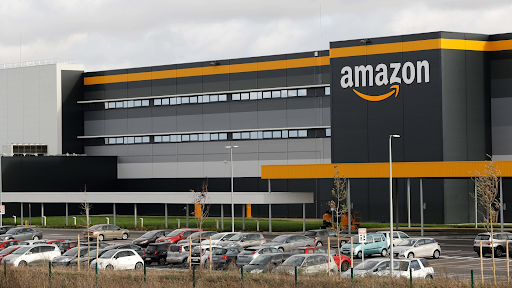By Seth Onyango
Amazon, the global e-commerce titan, has launched its operations in South Africa, marking a significant step in its strategic push into the African market.
This move signals Amazon’s intent to tap into the continent’s growing online retail sector, where the potential for digital sales is largely untapped but rapidly expanding due to a surge in internet penetration and mobile phone use.
“Building a strong relationship with South African brands and businesses is incredibly important to us. We want Amazon.co.za to be the place where they can reach millions of customers,” said Robert Koen, managing director of Amazon Africa.
Amazon looks keen to integrate local businesses into its ecosystem, providing them with a platform to reach a broader audience.
More than 60% of the items sold in Amazon’s stores globally are from independent sellers, most of which are small and medium-sized businesses.
In South Africa, Amazon is set to go head-to-head with Naspers Ltd’s Takealot, the current market leader, as well as online retailers like Shein and Temu, which have been making inroads with their aggressive pricing and marketing strategies.
The entry of Amazon is expected to ignite a fierce battle for market dominance, leveraging its vast financial resources, extensive logistics network, and deep understanding of e-commerce dynamics to compete with these established players.
Africa’s e-commerce market is at a tipping point, driven by a youthful population, increasing digital access, and urbanization that is concentrating consumer markets in major cities.
Amazon SA guarantees same-day and next-day delivery options, and it offers over 3,000 pickup locations nationwide to support home delivery services.
First-time customers will receive free delivery, and all subsequent purchases over 500 rand ($27.07) will also be delivered free of charge.
South African shoppers can explore an extensive selection of products, featuring both local and international brands in over 20 categories, including consumer electronics, home goods, and small kitchen appliances.
Importantly, the platform includes prominent global brands such as Apple, highlighting Amazon’s commitment to merging international and local shopping experiences.
Despite these promising trends, the market has faced challenges such as inconsistent addressing systems that complicate delivery logistics and the need for scalable business models to overcome infrastructural barriers.
Amazon’s strategy includes significant investments in local warehousing to improve delivery times and reduce costs.
This logistical enhancement is crucial in a market where swift, reliable deliveries are not always guaranteed due to the lack of a standardized addressing system.
Since 1999, the Universal Postal Union has assisted national authorities in assessing their addressing needs, including the design of specifications and address dissemination methodologies, to enable interoperability at the international level.
In 2009, the UPU launched an ambitious initiative, “Addressing the world – An address for everyone”.
In Tanzania, street naming and house numbering committees are ensuring the allocation of address the municipal level.
By potentially introducing innovative geo-location and addressing solutions, Amazon aims to overcome these operational bottlenecks and set new standards for delivery and customer service.
The company’s launch is also a boon for local suppliers and businesses. By partnering with these vendors, Amazon not only enriches its product offering but also supports the local economy, fostering growth and sustainability.
This collaborative approach could transform the retail landscape, offering consumers a wider range of products and more competitive prices.
Amazon’s entry is likely to create thousands of jobs in South Africa and across the continent as it expands further. From logistics and warehousing to customer service and digital services, the employment opportunities align with Amazon’s commitment to supporting local communities and economies.
However, Amazon’s path won’t be without challenges. Local competitors like Nasper’s Takealot have established brand loyalty and an understanding of consumer preferences and nuances.
Meanwhile, fashion-focused platforms like Shein and Temu appeal to price-sensitive consumers looking for the latest trends without the premium costs associated with traditional retail.
Naspers Ltd., the biggest company in Africa by market value, is ramping up its investment in its South African online retail operations to counter Amazon’s imminent entry into the nation’s burgeoning e-commerce market.
“Increasing our investments significantly in our ventures, “Phuthi Mahanyele-Dabengwa, CEO of Naspers’ South African operations, told Bloomberg in January.
“We are strategically prepared to handle any challenges that Amazon might present.”
To counter these challenges, Amazon will leverage its global expertise in data analytics and customer service to offer a shopping experience that is both personalized and user-friendly.
The company’s ability to analyze consumer behavior and adapt quickly to market needs will be key to outpacing competitors who lack similar technological prowess.
bird story agency
Amazon has launched operations in South Africa, signaling its strategic entry into Africa's burgeoning e-commerce market. This move aims to leverage increasing internet penetration and mobile phone use to tap into the continent's digital sales potential. Robert Koen, Managing Director of Amazon Africa, emphasized building strong relationships with South African brands and businesses. Over 60% of items sold on Amazon globally come from independent sellers, primarily SMBs. Amazon will compete with local leaders like Takealot, Shein, and Temu, using its financial resources, logistics network, and e-commerce expertise.
Africa's e-commerce market is growing due to a youthful population, increased digital access, and urban growth. Amazon SA promises same-day and next-day delivery, free first-time delivery, and extensive product offerings, including international brands like Apple. However, the market faces challenges like inconsistent addressing systems and infrastructural barriers. Amazon plans significant investments in local warehousing and potential geo-location solutions to improve delivery logistics.
Amazon's entry is expected to support local suppliers, foster economic growth, and create jobs across various sectors. However, it will face challenges from established local competitors with strong brand loyalty and consumer insights. Amazon's expertise in data analytics and customer service will be crucial in delivering personalized shopping experiences to outpace rivals.
Naspers Ltd. is ramping up investments in its South African online retail operations to counter Amazon's market entry. The competition is expected to be intense, with Amazon leveraging its global expertise to offer a user-friendly shopping experience.






